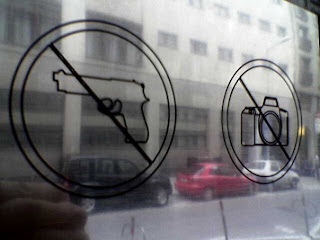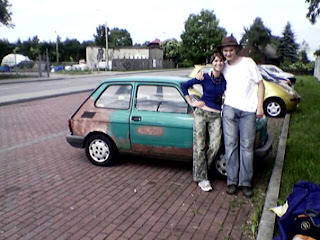
Interviewing a farm manager
New England U.S.A It takes some effort for me to sit down, lean back and start to write again.
I had consigned myself to the fact that, with my travels over, there was nothing to describe, picture and tell to other people and thus no point in writing. So my writing withered out of me with sheer lack of use, when all I had to do was look around for things to look at, find people to learn from and start up my computer.
Think about my room The floor lies covered in crumbs, fluff, several hats and a calling card to a Cambodian guesthouse, while the posters hang lopsided from cratered walls. A fake Hawaiian lei is strung from one bedpost while a collection of maps poke dejectedly from behind the broken chest of drawers. Quietly I heft my bags and turn out the light, leaving a dirty floor and an unmade bed as I close one door and open another.
Think about my friends Ashley, yesterday rollerblading with a pink shawl and tinted Ray Charles-esque glasses, looking like some chain-smoking French artist called Fabian or Dominique. From behind closed doors there is Chris, nursing another soda-induced bout of withdrawal. Moodily, he consoles himself with a computer game while Communist Corey sits in bed and jeers the world in general.
Think about leaving Carry bags in one hand, laptop clenched in the other. Swing up on the ladder and climb, balancing on the roof rack and tying things down with bungee cords as from above clouds open that emit fierce bouts of snow/rain. Stalk around the bus; check the lights, the fuel, the brakes. Start the engine and remove the chocks.
Think about our bus There is a sound, a grumble almost; the dragons roar emminating from beneath feet that are curled up, together with the rest of us, on rickety green seats. Those that sleep have slightly screwed up faces, caused I imagine by stuffing your body into a space as small as a newborn babies crib.
Past the sleeping bundles is a mass of shelf, boxes and coolers. Somewhere within this wooden tangle stooped figures bump to and fro against storage bins, knives in hand as they prepare piles of lettuce, meat and cheese. Someone grips a seat and swings themselves forward towards the front, shouts the word “Lunch” and retreats back to their lair.
Think about arrivalsSometimes I get off the Shackleton bus and can’t help but act child-like; nearly jumping with excitement when the door slides open and I can look around our new environment, whatever and wherever that is.
Maybe a field, a thousand shades of possible green, maybe a lake, textured water, a sunset-clad afternoon fresh with the noise of birds. There could be a dirt-stain of a backpack slung over one shoulder, a laptop grasped under an arm. This is one of those times, as rumbling slowly, the bus circles a grassy knoll and I see a small whitewashed cottage ahead.
Think about changesBags in hand, running for the “best” bed, opinions differing with each Goldilocks like session of experimentation.
Swap a block for a house, dirty for clean, lonely for company.
Swap a dorm for a room, the difference in personality and warmth, a room a sacred thing, the dorm a necessity.
Swap cooks, from a professional conisure of asparagus and hollandaise sauce, curries and hams, salads in a dozen varieties to a student with a bowl of pasta at their disposal.
Swap A school of 35 for a crew of 9, a community for a microcosm of the later.
Think about classA farmyard, muddy with car use and cow dung, hurried looking workers shuffle, forming a small stream of humanity which flows into a sea of bovines, cows, dozens lined like some farce of an army against the steel fences which hold them. “My sword is my pencil, my shield my notebook”, taking notes here, scribbling rants there, trying to focus on the speaker. “Be a sponge” absorb information in preparation for P.O.L’s, the time for squeezing that information out and soaking others with knowledge.
Think about an educatorAsk Nikki and Nelia, find out information from smudged reference books and photocopied sheets of paper, listen. Hear what a cow farmer is saying, don’t take things at face value and write notes. Take advantage of experts in the field; literally so at this point, find someone and speak to them with the purpose of adding to what you already know.
Think about asking questions“How many people do you employ?” “What’s your definition of sustainable agriculture?” “What is A.I?” “How long have you been farming?” Scrawl down illegible notes, keep eye contact, try to appear like you know things when the replies come “Twenty five” “a system of growing plants that will last for our children”, “artificial insemination” “eight years”.
Think about endingsAt the end there is the bus, engine humming gently in the chill air. Through a corridor of hands waiting to be shook, giving out tee shirts as I walk. Swing, up through the doors as the bus rolls forward and picks up speed. From somewhere inside there is music, the tinny kind from laptop speakers, the bus dwindles and is gone.

Getting close and personal with automatic milking

Dinner with the crew

Circle of chow

An automatic head scratcher for cows

Donated accomidation and bath, Vermont

Endings






























